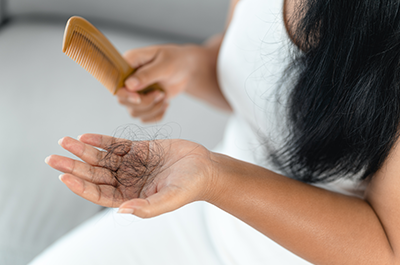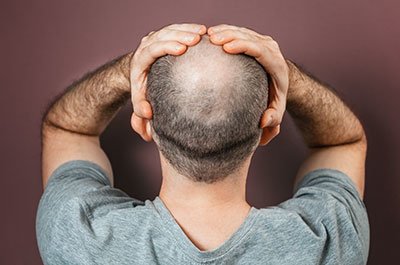Love it or hate it, gray hair is a natural part of aging. Some people start seeing white or silver strands in their 20s, while others don’t go gray until their 50s or later.
Why does hair turn gray, and is it possible to slow this process? Sumaiya Islam, M.D., a family medicine doctor at Henry Ford Health, explains the science of graying and whether we can put the brakes on it.
What Causes Gray Hair?
Each of your hair follicles contains cells called melanocytes, which make your hair’s pigment, or color. But as we get older, the melanocytes slow down their pigment-making power and, eventually, stop altogether. Without pigment from melanocytes, your new hairs will lose their natural color and will appear gray, silver or white (or a mix of these).
“The shutdown of melanocytes is a natural part of aging, and usually isn’t a sign of any health issues,” says Dr. Islam. “But certain factors affect how soon and how quickly you go gray. And in some cases, it may be a sign of an underlying health condition.”
Genetics
Wondering when you’ll start to see gray hair? No one can say for sure, but you’ll likely get a clue from looking at your parents and grandparents.
“Genetics play an important role in determining when your melanocytes will shut down,” says Dr. Islam. “Although we’ve known for years that early grays can run in the family, we also now have evidence of it. Recent studies have identified a specific gene linked to premature hair graying.”
Stress
The myth about stress causing gray hair may not be a myth after all. “Mental or physical stress, such as a traumatic life event or a serious illness, triggers the fight-or-flight response,” says Dr. Islam. “This response causes oxidative stress in the body, which can speed up the loss of melanocytes in mice. We need human studies, however, to learn more and confirm these findings.”
Smoking

You may already know that smoking can age your skin, leading to accelerated wrinkling and fine lines. Turns out that tobacco may age your hair, too. “Research shows that smokers are 2.5 times more likely to go gray early when compared to nonsmokers,” says Dr. Islam.
Although vaping is technically tobacco-free, it may not be a better alternative to cigarettes. “Vapes contain nicotine, which is linked to premature graying and hair loss,” Dr. Islam says.
Nutritional deficiencies
Deficiencies in some vitamins and minerals could lead to gray hair at a younger age. “Research suggests that low levels of calcium, copper and iron may cause premature graying,” says Dr. Islam. “If you have signs of a deficiency, your provider may recommend blood tests to check your levels.”
Thyroid disorders and gray hair
Hypothyroidism (underactive thyroid) could contribute to gray hair in some people. But chances are, gray hair would not be the only sign of this condition. “Hypothyroidism symptoms often include fatigue, constipation and weight gain,” Dr. Islam says. “A blood test can measure your thyroid levels so your doctor can identify or rule out this issue.”
Is It Possible to Slow Down Gray Hair?
You can’t change your genetics, but you may be able to slow down those silvers if you:
Manage stress
Everyone faces stress in their lives, and we can’t always control what happens around us. But what you can do is calm your body’s response to stress, which could preserve your hair’s natural color, too.
“Consider yoga, meditation, deep breathing or exercise to help calm your body’s fight-or-flight response,” says Dr. Islam. “We don’t know if these techniques will slow the process of hair graying, but we know they’re great for your overall health. So you have nothing to lose and plenty to gain by practicing habits that help you cope with stress.”
And if you need additional support, such as a counselor or mental health professional, talk with your provider. “Your primary care provider can refer you to a specialist who can provide the care you need,” says Dr. Islam.
Avoid or quit smoking
Smoking, chewing tobacco, e-cigarettes, vaping—all of these habits damage your health and hair. They can be hard to quit, but you’re not alone. “If you do smoke and need help quitting, talk with your healthcare provider,” says Dr. Islam. They can help you find a method that works for you.”
Eat a healthy diet
An apple a day won’t necessarily keep the gray hair away, but an overall balanced diet might. “Eating a diet rich in fruits, vegetables, whole grains and lean protein provides most people with all the nutrients they need,” says Dr. Islam.
And skip the high-dose vitamins or “anti-gray” supplements. These products haven’t been proven to work, and some could be dangerous. “Some supplements can interact with medications or cause serious health problems like liver damage,” Dr. Islam says. “Always talk with your provider about supplements, including vitamins and herbs, to be sure they’re safe for you.”
Focus on Health at Any Age
Whether you embrace your grays or opt for hair color, what’s most important is your health. “Gray hair is not a sign of being unhealthy or old. It’s a natural part of life,” says Dr. Islam. “How you wear your hair is your choice. What matters is keeping your body and mind healthy so you can feel your best.”
Reviewed by Sumaiya Islam, M.D., a family medicine doctor at Henry Ford Health.



